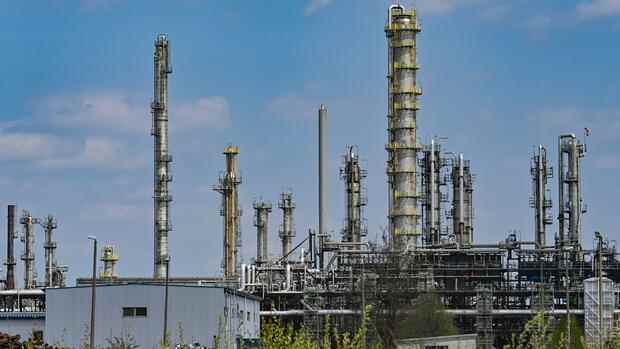The proposal is part of a new package of sanctions.
(Photo: dpa)
Companies from Germany and the other EU countries should no longer be allowed to import Russian oil in the future. This is what the EU Commission and the European Foreign Service are proposing for a new package of sanctions against Russia, as the German Press Agency in Brussels learned from several officials on Wednesday night. In order to give the countries time for the changeover, there should be transitional periods.
Specifically, according to the information, it is planned that after a phase-out phase of six months an import ban for crude oil will apply and after a phase-out phase of eight months an import ban for oil products will also apply. It should also play a role whether deliveries are made by pipeline or by ship. According to the information, far-reaching exemptions are only planned for Hungary and Slovakia. These two EU countries are currently still getting a large part of their oil needs from Russia and, due to a lack of access to the sea, do not see themselves in a position to develop alternative sources of supply as quickly as other countries.
In addition to the oil embargo, the proposal by the responsible EU institutions also includes new penalties against companies, according to dpa information. Among the latter are the largest Russian bank, Sberbank, as well as two other banks and TV stations that are specifically spreading misinformation about the Ukraine war. The banks should no longer be able to use the international financial communication system Swift.
Actors responsible for the Russian atrocities in Ukrainian cities such as Bucha and Mariupol are to be added to the EU list of people and organizations whose assets are to be frozen.
Top jobs of the day
Find the best jobs now and
be notified by email.
In order for the planned sanctions to come into force, the approval of the governments of all 27 EU countries is now required. That is why their permanent representatives in Brussels want to start deliberations on the proposals sent out during the night as early as this Wednesday. If there are no more major objections from the capitals, they could then be decided in the coming days.
EU citizens could incur significant additional costs, particularly as a result of the oil embargo. Federal Economics Minister Robert Habeck (Greens) expects high “price jumps”. One of the reasons is that Russian oil must be replaced by probably more expensive alternatives from other countries. In addition, the conversion of refineries and delivery routes means effort and costs. But hardly anyone dares to predict when and to what extent refueling or heating will become more expensive.
The new package of sanctions is the sixth that the EU Commission and the European External Action Service (EEAS) are launching. The economic punitive measures are primarily intended to help deprive Russia of the financial resources to continue the war of aggression against Ukraine.
The EU foreign policy chief Josep Borrell recently said on the subject: “The aim of our sanctions is to stop the ruthless, inhuman and aggressive behavior of the Russian troops and to make it clear to the decision-makers in the Kremlin that their illegal aggression has a high price.” EU Commission President Ursula von der Leyen stated that the greatest possible pressure must be maintained on Russian President Vladimir Putin and the Russian government. The top German politician wants to publicly present the sixth package of sanctions this Wednesday morning in the European Parliament.
More: Serbian President: “We have been victims of sanctions for a long time, we do not believe in this policy”
